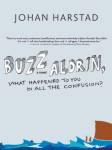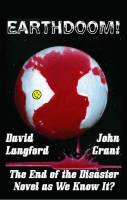 Today, I’m trying out a different approach to blogging about an anthology, by concentrating on three particular pieces from it. The anthology in question is the Autumn 2011 issue of Granta, whose theme is ‘Horror’. It was my first time reading all three of these authors; I’ll go through their work in the order in which it appears in the anthology.
Today, I’m trying out a different approach to blogging about an anthology, by concentrating on three particular pieces from it. The anthology in question is the Autumn 2011 issue of Granta, whose theme is ‘Horror’. It was my first time reading all three of these authors; I’ll go through their work in the order in which it appears in the anthology.
Will Self, ‘False Blood’
This is an account of how Self was diagnosed with and treated for polycythemia vera, a condition which causes the blood to thicken through the overproduction of red blood cells. It’s a very frank piece: Self writes matter-of-factly about his past of drug-use – neither apologising not seeking to justify it, but simply treating it as something that happened – and how it left him afraid of needles, which made his treatment (by having excess blood extracted) all the more difficult.
The horror of ‘False Blood’ seems to me to lie less in the mechanics of Self’s illness and treatment (though there is certainly some of that, and you may well find yourself picturing the blood flowing – or otherwise – through your own veins) than in something more existential. Self reflects on death and disease, and how we dress them up in metaphors in the vain hope of making them more palatable – and comes to the conclusion that it’s better to confront those phenomena without metaphors. But Self acknowledges that disease has been one of the key metaphors he has deployed in his fiction.
So, just as the very blood-flow which sustains Self’s life is now threatening it, so a cornerstone of his life’s work has gained a chillingly personal resonance. Perhaps the true horror of this piece comes from the thought of being betrayed by the most familiar and trusted of things.
Rajesh Parameswaran, ‘The Infamous Bengal Ming’
A tiger wakes up one day (“the worst and most amazing day of my life,” p. 167) and realises that he feels love – the love that comes from a deep friendship – for his keeper, Kitch. But where is Kitch today? Ming is getting hungry and wants to see his keeper and friend. When Kitch finally arrives, he’s with another, rather nervous, member of zoo staff; the tiger’s friendly move towards Kitch scares the other man, so Kitch strikes Ming with his stick – and then it all goes wrong.
When I started reading ‘The Infamous Bengal Ming’, I thought Parameswaran’s decision to give the tiger such a fluent, human-like narrative voice was amusing but perhaps misjudged – surely that wasn’t how an animal would really think? But now I see that the voice was judged perfectly, because the affect of the story is founded on the tension between the measured, reasonable tone of the narration, and the way Ming’s animal instincts intrude upon it. It’s not just that the tiger tends to misinterpret the human characters’ behaviour; it’s also that the way he reacts and explains himself can be at odds (sometimes chillingly so) with what his voice lulls us into expecting. This story is extracted from Parameswaran’s forthcoming collection, I Am an Executioner, to which I now look forward eagerly.
Julie Otsuka, ‘Diem Perdidi’
Diem perdidi is Latin for “I have lost the day”, which sums up what has happened to the woman with dementia who is at the heart of this story. The text consists mainly of declarative statements about what the woman does and doesn’t remember (sometimes addressed directly to the woman’s daughter – though neither character is ever named). With what might seem to be a rather restricted palette, Otsuka paints vividly what has passed in the lives of the woman and her family; and what is now being lost, the little cruelties of (and those caused by) being able to remember the relatively distant past, and long-held routines, but not what happened a few minutes before. Otsuka’s prose is dotted with poignant turns of phrase, such as: “She remembers that today is Sunday, which six days out of seven is not true” (p. 252). Clearly another writer whom I need to read further.
Elsewhere
Granta magazine
Author websites: Will Self; Julie Otsuka.
Read an abridged version of ‘False Blood’ on the Guardian website.
Additional content on the Granta site.
 I’ve long been interested in social and cultural history, and there will always be a place on my shelves for books that illuminate the more unusual corners of history. On Roads is just such a book.
I’ve long been interested in social and cultural history, and there will always be a place on my shelves for books that illuminate the more unusual corners of history. On Roads is just such a book.
 Magician Peter Ruchio was humiliated, and his career derailed, by a prank played by Titus Black at the latter’s eighth birthday party; fifteen years later, Black has grown up to be a famous illusionist (though he is not above committing murder to preserve his secrets), whilst Peter is performing tricks in restaurants and old people’s homes. A chance encounter with Kate Minola, a grifter on the FBI’s Most Wanted list, gives Peter the opportunity to take his revenge on Black; but his experiences ultimately lead Peter to seek the help of Dr Chris Tavasligh, a neuroscientist working on a way to ‘reboot’ the human brain, thereby erasing all memories. That was three years ago, and Tavasligh subsequently disappeared; the book in our hands purports to be the scientist’s collected papers.
Magician Peter Ruchio was humiliated, and his career derailed, by a prank played by Titus Black at the latter’s eighth birthday party; fifteen years later, Black has grown up to be a famous illusionist (though he is not above committing murder to preserve his secrets), whilst Peter is performing tricks in restaurants and old people’s homes. A chance encounter with Kate Minola, a grifter on the FBI’s Most Wanted list, gives Peter the opportunity to take his revenge on Black; but his experiences ultimately lead Peter to seek the help of Dr Chris Tavasligh, a neuroscientist working on a way to ‘reboot’ the human brain, thereby erasing all memories. That was three years ago, and Tavasligh subsequently disappeared; the book in our hands purports to be the scientist’s collected papers. Matthias Politycki’s Next World Novella (translated from the German by Anthea Bell) is the latest title from
Matthias Politycki’s Next World Novella (translated from the German by Anthea Bell) is the latest title from  A brilliant fusion of biography, social history, and history of science, that tells a fascinating story. Henrietta Lacks was a poor African American woman who died of cervical cancer in 1951; as with other cancer patients at Baltimore’s Johns Hopkins Hospital, a sample of the cells from Henrietta’s tumour was taken, without her knowledge, for research purposes. Those cells were the origin of the HeLa cell line, the first human one to be propagated successfully in the lab (‘immortal’ because they can divide indefinitely in culture). Henrietta’s cells facilitated many medical advances, but it was twenty years before her family even learnt that a sample had been taken.
A brilliant fusion of biography, social history, and history of science, that tells a fascinating story. Henrietta Lacks was a poor African American woman who died of cervical cancer in 1951; as with other cancer patients at Baltimore’s Johns Hopkins Hospital, a sample of the cells from Henrietta’s tumour was taken, without her knowledge, for research purposes. Those cells were the origin of the HeLa cell line, the first human one to be propagated successfully in the lab (‘immortal’ because they can divide indefinitely in culture). Henrietta’s cells facilitated many medical advances, but it was twenty years before her family even learnt that a sample had been taken.











 It was while travelling around eastern Europe with a friend that Simon Varwell developed a certain fascination with that [insert adjective of your choice here] hairstyle, the mullet. Back home in Inverness a year or so later, in 2002, Varwell discovered that there was a village in Albania named Mullet — and was taken with the notion of trying to visit everywhere in the world with the world mullet in its name. Up the Creek Without a Mullet chronicles the author’s travels up to 2005 (in Albania, Ireland, and mostly Australia), searching for mullets – places and haircuts alike.
It was while travelling around eastern Europe with a friend that Simon Varwell developed a certain fascination with that [insert adjective of your choice here] hairstyle, the mullet. Back home in Inverness a year or so later, in 2002, Varwell discovered that there was a village in Albania named Mullet — and was taken with the notion of trying to visit everywhere in the world with the world mullet in its name. Up the Creek Without a Mullet chronicles the author’s travels up to 2005 (in Albania, Ireland, and mostly Australia), searching for mullets – places and haircuts alike.
Recent Comments